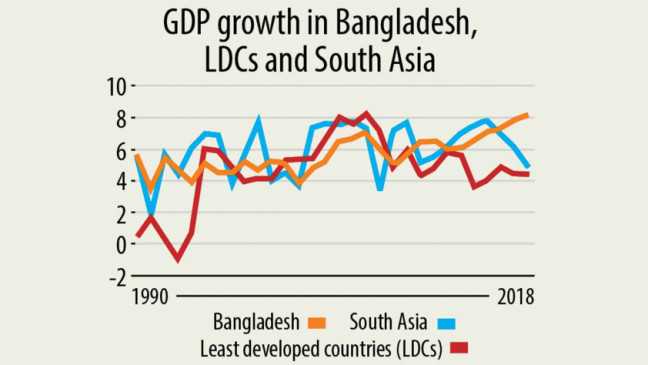Covid poses challenges for LDC graduation

Image: Collected
Bangladesh is set to graduate from the group of the least-developed countries but will face some challenges during the transition period because of the devastating impacts of the coronavirus pandemic, said a United Nations agency.
The United Nations Conference on Trade and Development (Unctad) said the emergence of the pandemic and the ensuing global recession had interrupted a period of rapid economic growth. "Yet, the country has so far weathered the crisis relatively well and appears set to record positive GDP growth even in 2020, notwithstanding a sharp slowdown in economic activity."
Before March this year, the Unctad had assessed Bangladesh's vulnerability profile based on the pre-Covid data of the economy to determine the graduation criteria.
The sudden onslaught of the Covid-19 from March onwards has badly impacted the global economy and also Bangladesh, leading the UN body to come up with a separate vulnerable profit. It shared the findings with the government on December 10 and suggested for addressing some challenges during the transition period for smooth and sustainable graduation.
The government is preparing a position paper to be placed in the second triennial assessment on the country's graduation by the UN Committee on Development Policy in January.
According to the Unctad's latest profile, despite all the positives of the past decades, some deep-seated challenges continue to linger on Bangladesh's sustainable development prospects, notably the modest progress in terms of export diversification, and the elusive quest for adequate sustainable development finance.
These challenges are made even more formidable by the fallout from the pandemic, which threatens to leave long-lasting scars on the world economy, making the international environment less conducive.
The emerging mega-trends such as climate change and digitalisation are bound to exert wide-ranging implications for the future development trajectory of developed and developing countries alike.
Despite the new challenges, Bangladesh is scheduled to graduate to a developing nation in February as the country has already extraordinarily outperformed in all the three criteria. The transition period will end in 2024.
The Unctad said that notwithstanding Bangladesh's success in strengthening its overall export capacities, the evidence points to limited progress in product diversification. The clothing items contributes 85 per cent of gross exports.
If there is indeed some untapped scope for product differentiation, alone this is unlikely to provide a decisive spur to an industry that has relied largely on cost- competitiveness and preferential access to developed markets.
Estimates of the impact of losing LDC-specific preferential market access range between 7 per cent and 14 per cent of exports, with the bulk of the reduction impinging on textile and clothing exports to developed markets, where changes in tariffs would be relatively more adverse.
Similarly, large tariff differentials, coupled with persistent infrastructural and logistics bottlenecks, are bound to entail a serious blow to an industry for which these dimensions represent major drivers of international trade and investment flows.
Rubana Huq, president of Bangladesh Garment Manufacturers and Exporters Association, has sought 10 years as the transition period for Bangladesh as the domestic economy, employment and export were severely affected by the pandemic.
The Unctad's profile also said if Bangladesh is to continue its remarkable growth performance, the country has to diversify into gradually more complex products.
The advent of robotisation and industrial digitalisation also questions the sustainability of Bangladesh's progress in bolstering its productive and export capacities.
These so-called "mega-trends" – which have in many ways accelerated in the wake of Covid-19 – are expected to trigger far-reaching reconfigurations in existing global value chains, reducing heightened dependence on key suppliers, encouraging reshoring and regional embeddedness, and potentially weakening the importance of low-labour cost competitiveness.
Unlike in many other countries, in the case of Bangladesh, this resilience appears to be vindicated also in the context of the Covid-19 crisis and ensuing global recession.
"If the outlook in 2020 appears to be reasonably encouraging, however, this might be at least partly due to idiosyncratic factors; the medium-term future remains far more uncertain," the Unctad said.
With the impact of the pandemic still weighing down economic prospects for 2021, global labour markets are unlikely to rebound quickly, especially in key destinations for Bangladeshi migrants such as the Gulf nations, the United Kingdom, the European Union and the United States.
"These prospects loom large on the remittances outlook."
Bangladesh growth performance in the last 10-15 years has been characterised by a considerable investment push, with the investment-to-GDP ratio consistently exceeding 25 per cent of GDP since 2006, and reaching 31 per cent prior to the Covid-19 shock.
"There is little doubt that this trajectory is consistent with the economy's need to redress supply-side bottlenecks, especially in terms of infrastructural provision."
The Covid-19 shock entails an even darker outlook in relation to Bangladesh second-largest source of external financial resources, namely official development assistance flows, the profile said.
Over time, inward foreign direct investment flows have climbed up in absolute terms, but since the early 2000s, they have represented not more than 4 per cent of gross fixed capital formation.
The UN body said in the context of LDC graduation, it is all the more important that phasing out of LDC-specific international support measures does not disrupt the promising trajectory on which Bangladesh has embarked.
It called for strengthening domestic resource mobilisation, bolstering investments in climate-resilient and digital infrastructures, sustaining investments in human capital, supporting technological up-gradation, continuing fostering rural development and adopting a proactive industrial policy framework.
Source: https://www.thedailystar.net
Tags :
Previous Story
- Covid-19 and SDG 8: Reviving economies, restoring livelihoods
- Remittance resurgence zero cure for sickly emerging economies
- Pandemic may result in corporate, household debt defaults
- 'Bangladesh battling against Covid-19, its economic fallout'
- Bangladesh an inspiration to South Asian peers
- ‘Completion of Padma Bridge to boost Bangladeshi economy’
- Move away from growth delusion
- Remittance of over 10 billion dollars in 5...